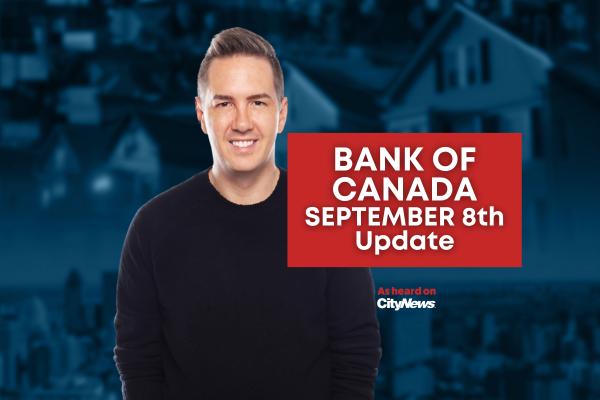On 95.7 News Radio, Clinton and Todd discussed the importance of credit monitoring due to rising fraud and data breaches.

Bank of Canada – An optimistic hold for Canadians | September 8th, 2023
Clinton Wilkins joins Sam Laprade on CityNews to discuss the Bank Of Canada’s hold on the key interest rate and what this means for Canadians. Clinton also talks about where he thinks the interest rate trends are going in the future.
The Bank of Canada holds the key interest rate at 5%
Sam Laprade 00:01
The Sam Laprade show continues on City News 1011 FM and 1310am. Well, when I think about the Bank of Canada, I always think about Clinton Wilkins. He always joins me here on these important days where the Bank of Canada makes an announcement. Clinton joins me now. Hi, Clinton.
Clinton Wilkins 00:23
Hi, Sam. How are you doing?
Sam Laprade 00:24
Good Clinton is from Centum Home Lenders ltd. We heard from the Bank of Canada a little bit earlier today, they’re gonna hold the key interest rate at 5%. This was a relief, I believe for for many, but very quickly, Tiff Macklem shared that it doesn’t mean that there’s not going to be other rate increases to come.
Inflation trends could lead to more holds
Clinton Wilkins 00:46
I agree. You know, the inflation is going in the right direction, I don’t think it was quite where, you know, they wanted to the last couple of months. But the impacts from the increases the last 12 and 18 months now are really happening, Sam. I think Canadians are spending less, and the inflation is going in the right direction. You know, some economists were really on the fence, whether it was going to be a hold or whether the Bank of Canada had another 0.25 increase in their arsenal. But today, they’ve decided to hold and I think a hold is optimistic for Canadians. We’ve been through a lot with these interest rates in the last 18 months with the increases. And I think in a more plateau situation. Even knowing the rates are high right now it’s a lot easier for people to plan and make decisions around the next few months. The Bank of Canada is not meeting again until the end of October, October 25 is the next meeting. So I think if the inflation numbers are you know where they’re at, or even in an improved situation, I’m optimistic that we will continue to be in a plateau.
Sam Laprade 01:44
And after October 25, what’s the next date?
“If we continue to see this downward trend in inflation, rates may start softening.”
Clinton Wilkins 01:48
December 6, I believe it’s the first week of December is the final, yes December 6 is the final rate announcement of the year. And, you know, I think if we hold in October, and you know, we’re still going in the right direction, I’m optimistic that it’ll be hold for the rest of the year. Some economists think that, you know, if we do continue to see this downward trend in inflation, rates may start softening midway through 2024. So, I’ll fall on my sword, Sam will have to write this down. Midway through 2024, we might start seeing some softening. And I was on with your colleague in Halifax, just before I was on on here with you. And he asked how long do you think it’s going to be before rates are back to, you know, a more normal or balanced situation? I suspect on the way down, Sam, the rates are going to be much lower to reduce than they were to increase.
Sam Laprade 02:42
Unfortunately, I mean, I don’t even do this, you know, like you do. But I feel the same way in terms of you know, the the rates and a lot of people, Clinton right now kind of holding their breath, they might be up for renewal on their mortgage, they might be trying to get into the market, they may be thinking, gee, should I get out of this variable and try to get into a fixed rate. Some advice for us?
Shorter term fixed rates provide payment certainty
Clinton Wilkins 03:06
Some people, you know, I would say that the trend is really moving into shorter term fixed, and the shorter term fixed are not necessarily the less expensive than your than the existing variable. A shorter term fixed, you’re somewhere in the six, six and a half percent range. The reason that people are taking a shorter term fixed, it’s not because it’s necessarily cheaper than the variable would be, but it’s providing people with stability and payment certainty. And right now that sometimes has more value than maybe a lower interest rate. And, you know, the reason that a three year fixed, for example, is so popular is because if the rates do start softening next year, Sam, it’s going to take a couple of years for really that softening to then take effect. And, you know, for the rates to come down. So I would say three year fix is one of the most popular. And historically Canadians take a five year. 60% of Canadians take a five year interest rate. So we’re definitely in a different situation. Many, many Canadians have their mortgage coming up, I think more than 50% of people have a mortgage have their mortgage coming up for renewal in the next two years. So the bulk of those borrowers are going to be renewing into a higher rate. So obviously that’s going to have an impact and many people in terms of their monthly budget. And I think anybody who has their mortgage coming up for renewal, you really need to get some financial advice on what’s going to work best for you. And I think seeking unbiase advice from a mortgage professional is really important, because you may look at something like changing lenders and maybe then you can leverage to get a maybe a better interest rate or potentially reworking your mortgage term and taking a longer amortization. I know we talked about that before, and that will reduce the payment and not necessarily reduce the cost of boring per se, but maybe the cost of monthly cash flow.
Sam Laprade 04:55
When is it a good idea Clinton to kind of pay that penalty to get out have a mortgage before, you know, before sort of changing into maybe a variable into a fixed and the rate of that of that penalty, when’s it a good idea? And when maybe to stay away?
When to break your mortgage
Clinton Wilkins 05:13
I get asked this question every day. You know, I think first finding out what the penalty is, I think that’s really important. And then I think, secondly, really evaluating what your plans are. So you know, we have customers right now that are choosing to break their mortgage early, some that are in a variable and pay their three month interest penalty. In many cases $3,000 or more sometimes can be capitalized on the new mortgage, and clients are choosing to do that for stability. It’s not necessarily going to save them money. So we look at what the penalty cost is. And we look at what the new interest rate is, if the prime rate even stays the same, they’re not necessarily going to say on a daily basis, or a monthly basis, but they’re choosing to do this because of stability. So I think that’s one thing that you really need to think of, I think right now to break any mortgage early, it’s likely not going to be cheaper. Just taking into account where the rates are today, and what the penalty is. So I think the reason that people would break a mortgage early right now, Sam, is for that stability piece. Or if they need to pull some equity out of the property. You know, if you bought a property prior to 2020, you probably have some equity in it, even with the prices being soft or in some markets. You know, and I think that’s something to think about as well. Some people are choosing to pull out some equity to maybe get some other unsecured debts cleaned up. But I would say the number one reason that we’re seeing people break their mortgage early, is to take a longer amortization.
Sam Laprade 06:40
Brilliant as always appreciate your time, Clinton always great advice, especially on these important days for Canadians. Thank you.
Sam Laprade 06:47
Thanks, Sam. Have a great day. Clinton Wilkins joining us today from Centum Home Lenders ltd, talking about the Bank of Canada holding the key interest rate at 5%. Some thought might do 25 basis points, but in this case, they held it at at 5%. Next time around you just never know. Tif Macklem indicated that he may be looking at raising interest rates depending on how inflation goes.


